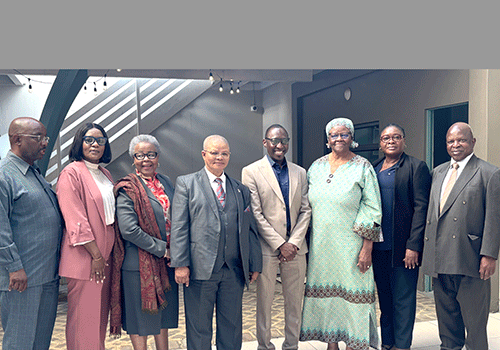President Netumbo Nandi-Ndaitwah has thrown her full support behind the transformation of the public service during a key meeting with the Public Service Commission (PSC) at State House yesterday.
High up on its agenda was a push for its independence through reforms to ensure the commission itself becomes more independent and better resourced, as outlined in the Constitution. While currently housed under the Office of the Prime Minister, PSC chairperson Salmaan Jacobs said the commission should have its own structure and access to financial and human resources to perform its duties effectively. The meeting marked the first official engagement between the President and the PSC.
Jacobs, speaking after the courtesy visit, said the discussions focused on aligning the commission’s vision with that of the President, particularly in strengthening governance and improving public service delivery.
“We wanted to share our vision and assure her that we fully support her goals for a professional, ethical and efficient public service,” Jacobs said.
President Nandi-Ndaitwah praised the commission for its work and stressed the importance of a capable and committed public service.
“As the Public Service Commission, the government administration depends on you to make sure we are served by people with the right skills and strong motivation. If either is missing, the result can be disastrous,” she said.
Another major concern raised during the meeting was the need to update and harmonise outdated legislation. Jacobs said parts of the Public Service Act are still used by regional councils, which sometimes conflict with newer policies.
This has led to confusion and inconsistency in implementation.
“There is a need to harmonise the laws so that the public service speaks with one voice. We shared this with Her Excellency, and she agreed, encouraging us to continue working with institutions like the ministry of justice and the Law Reform Commission,” Jacobs said.
Another strong point of discussion was the current manual system used for public service operations.
Jacobs explained that recruitment, record keeping and general administration are still largely done by hand. He emphasised the need for digital transformation to keep up with modern trends.
“The world is moving forward. People are talking about Artificial Intelligence and the Fourth Industrial Revolution. We must automate our systems to improve service delivery,” he advised.
The commission also highlighted the importance of human resource audit reports and the need for proper document management. Jacobs warned that incomplete personnel records can result in delays or losses in pension payouts when staff retire.
“Just one missing document can cost a public servant part of their pension or leave benefits. That is something we want to prevent through improved systems and compliance,” he noted.
The discussion also touched on the upcoming National Development Plan 6 (NDP6), which the President is expected to launch soon. Jacobs said public servants are key to making the plan a reality.
“When the President outlines a vision for education or healthcare, it’s the teachers, nurses and other public workers who implement it. That’s why we are committed to recruiting the right skills and continuously upgrading them to meet the demands of service delivery,” the commission chairperson said.
On the question of salary increases for civil servants, Jacobs said that while the commission does not set salaries, ongoing consultations with unions and government remain essential.
“Our government has always been a listening government. If resources are available and consultations are held, we trust that the right decisions will be made,” he said.
President Nandi-Ndaitwah concluded the meeting by urging the PSC not only to listen to her vision but to implement it. Jacobs described the interaction as “very successful and productive” and said the commission now feels fully aligned with the national direction.
“We left that meeting with a clear sense of responsibility and determination to support the President’s call for a people-centred, professional and effective public service,” he said.
The PSC was established in terms of Article 112 of the Constitution of Namibia as an independent and impartial body.
Its vision is to be an expert and thought leader which offers independent and professional advice on human resources management and administration of the government.
It also exists to provide sound advice to government on human resources management and public administration, whilst fostering compliance with the laws that govern the public service in Namibia.


